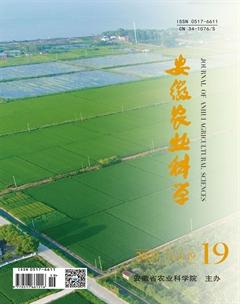百草枯的检测方法及其控制的研究进展
王良哲 单雪晴 孙秀兰 孙嘉笛
摘要 百草枯在农业生产中被广泛应用于除草。美国环境保护署(United States Environmental Protection Agency,U.S.EPA)设定饮用水中含量低于3 μg/L,欧洲指令(European Union Directive,98/83/EC)限制更严格,规定饮用水中允许的最大浓度为0.1 μg/L。此外,世界卫生组织(world health organization,WHO)对饮用水的参考值为10 μg/L。为了保护人类健康和环境免受这种除草剂的有害影响,需要简单有效的样品制备、灵敏的分析方法来测定环境水中的百草枯,并需要强有力和实用的处理工艺来去除水基质中的百草枯。详细介绍了用于检测百草枯的各种方法,如比色法、分光光度法、表面增强拉曼散射、液相色谱、气相色谱法以及能够实现现场快速检测的电化学检测方法和百草枯的降解与脱除的方法。
关键词 百草枯;检测方法;限量标准;催化降解;电化学检测
中图分类号 TS 207.5 文献标识码 A 文章编号 0517-6611(2021)19-0005-08
doi:10.3969/j.issn.0517-6611.2021.19.002
开放科学(资源服务)标识码(OSID):
Research Progress on Detection Methods and Control of Paraquat
WANG Liang-zhe, SHAN Xue-qing, SUN Xiu-lan et al
(State Key Laboratory of Food Science and Technology, School of Food Science, Jiangnan University, Wuxi, Jiangsu 214122)
Abstract Paraquat is widely used in weeding in agricultural production. The United States Environmental Protection Agency (USEPA) sets the content in drinking water to be less than 3 μg/L, and the European Union Directive (98/83/EC) has stricter restrictions, stipulating the maximum concentration is 0.1 μg/L. In addition, the World Health Organization (WHO) reference value for drinking water is 10 μg/L. In order to protect human health and the environment from the harmful effects of this herbicide, simple and effective sample preparation and sensitive analysis methods are needed to determine paraquat in environmental water, and a powerful and practical treatment process is required to remove the water matrix paraquat. This article described in detail various methods used to detect paraquat, such as colorimetry, spectrophotometry, surface-enhanced Raman scattering, liquid chromatography, gas chromatography, as well as electrochemical detection methods and paraquat that can achieve rapid on-site detection degradation and removal methods.
Key words Paraquat;Detection method;Limit standard;Catalytic degradation;Electrochemical detection
基金項目 江苏省农业科技自主创新资金项目(CX(17)3007)。
作者简介 王良哲(1995—),男,河北邢台人,硕士研究生,研究方向:食品安全检测。
*通信作者,助理研究员,博士,从事食品安全检测研究。
收稿日期 2020-08-20
农业生产的持续增长促使水、土壤和食品中农药残留量的增加。鉴于此,开发监测环境中不同类型农药以及分析农药残留的方法至关重要。然而农药的污染不仅限于土壤或水,而且还存在于食用受污染的食物或饮料、血液、尿液甚至母乳中经常发现农药残留。因此,目前正在全球范围内开发几种精确而灵敏的分析方法,以将其应用于“原位”或分析实验室中,并定量分析多种不同基质中的农药及其残留物。尽管百草枯毒性很高,但由于其成本低廉且易于使用,在全世界范围内仍然有约100个国家或地区在使用。虽然没有百草枯对人类神经系统危害的正式证据,但在啮齿动物研究中表明,百草枯可能引起类似帕金森的脑损伤。因此,农业和食品工业需要可靠、可行、可重现的分析方法和更加经济的降解或脱除方法。笔者综述了一系列的用于检测百草枯的方法,如色谱法、光学检测法、免疫检测法、电化学检测法等,以及可使百草枯有效降解或脱除的方法,以便开发更快速、更高效、更灵敏的检测方法,为开发更经济、更高效的降解或脱除方法提供帮助。

